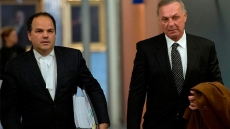OTTAWA — "(The government is) being very discriminatory when it comes to whom they are bringing in, and very reticent when it comes to allowing Muslim refugees to come to Canada, and that's an issue." — Paul Dewar, NDP foreign affairs critic.
___
After months of pressure from refugee advocacy groups, Syrian-Canadians, the United Nations and the opposition parties, the Conservatives made a commitment to resettle 10,000 more Syrian refugees in Canada over the next three years.
But concerns have been raised about the composition of that group, and whether the Conservative government's prioritizing of religious minorities amounts to discrimination.
Is the government discriminating against Muslim refugees from Syria?
Spoiler alert: The Canadian Press Baloney Meter is a dispassionate examination of political statements culminating in a ranking of accuracy on a scale of "no baloney'' to "full of baloney'' (complete methodology below).
This one earns a rating of "some baloney.''
Here's why:
THE FACTS
Syria's population is 74 per cent Sunni Muslim, 13 per cent Alwai, Ismali and Shia Muslim, 10 per cent Christian and three per cent Druze.
An estimated 90 per cent of refugees identify as Sunni Muslim, though many Christians won't declare their faith for fear of persecution, according to the U.S. Commission on International Religious Freedom.
Of the 10,000, roughly 40 per cent will be resettled directly by the government, with priority given to religious minorities, sexual minorities and victims of rape.
Who exactly the government resettles is decided by an agreement with the United Nations High Commissioner for Refugees.
Though a person can be declared a refugee based on fear of persecution due to their religion or ethnic status, those two categories are not explicitly among the criteria used by the UNHCR in deciding who ought to be resettled.
However, within the eight criteria that are used by the UN, religion can be a factor, such as in the category of women and girls at risk.
That means that within the profiles presented to Canada as options for resettlement, the government could whittle them down further by selecting on the basis of religion — a practice strongly discouraged by the UN.
"In selecting refugees for resettlement, UNHCR urges resettlement states not to use integration potential and other discriminatory criteria (e.g. family size, age, health status, ethnicity and religion)," the agency says.
"Such discrimination undermines the protection and needs-based approach to resettlement creating inequalities and protection gaps, and limits access to resettlement by some refugees most at risk."
That being said, the United Nations is unlikely to recommend refugees to Canada who stand no chance of being accepted.
"If I was going to read between the lines on this, the UNHCR just wants to get people out because it's such a desperate situation," said Alexandra Kotyk, the director of sponsorships for the Anglican United Refugee Alliance.
"I would suspect they may be willing to try and work with the government to resettle Christians, even though it's against their policy."
Statistics on the religious affiliation of resettled refugees aren't readily available.
When asked about the religious makeup of the 1,300 Syrian refugees Canada agreed to take in 2013, Citizenship and Immigration Canada could not provide an answer, saying refugees are not tracked by religion.
Private groups, meanwhile, are responsible for sponsoring the remaining 60 per cent of refugees coming to Canada.
Churches comprise roughly 72 per cent of the government-approved sponsors. Leaders of all denominations say their policy in selecting refugees is to focus on need, not faith, but it's up to each individual parish to decide who to sponsor.
Statistics are not readily available on the religious backgrounds of people sponsored by private groups, though Kotyk said when her church decided to sponsor several Iraqis as part of that refugee commitment, almost all of them were Muslim.
WHAT THE EXPERTS SAY
The Conservatives vigorously dispute allegations of discrimination, but some aren't convinced.
"We hope the government's decision regarding the prioritizing of Syrian refugees is not based on discrimination against those refugees of the Muslim faith," said Amira Elghawaby, human rights co-ordinator with the National Council of Canadian Muslims.
"However, the optics around this policy have not been reassuring."
Correspondence from the immigration minister, obtained by Citizens for Public Justice, suggested that the 1,300 already chosen for resettlement came from a pool of 3,500, said the Christian organization's spokesman, Brad Wassink.
"There's no hard numbers to say how many were Christian Yazidi or how many were Muslim, but there has to be some kind of system when you get 3,500 and you only bring in 1,300," he said.
Without the figures, it's hard to say if discrimination is at play, Kotyk said.
"I can't specifically say that until we see who they actually end up sponsoring, because the wording has been 'religious minorities' and there are Muslim religious minorities, not just Christian," she said.
"I hope that — if they're going to the UN and there are two profiles, one of an intact Christian family ... and then a single woman with a child who happens to be Muslim — that they are going to take the single woman and prioritize the resettlement need over the religious need."
There's also the question of the relationship between the government and private-sector sponsorship agreement holders. While the government has no say in who private groups select, they still must approve the applications.
In recent years, for example, the government has been imposing caps on applications from certain areas. While those caps are not in place for the Syrian commitment, their existence for refugee resettlement from other parts of the world has raised similar concerns.
"The government has no humanitarian ears and refuses to hear the pleas of (sponsorship agreement holders) and chooses to sponsor only those populations that have political or financial benefit," one respondent told a survey conducted by Citizens for Public Justice.
"It sounds a little conspiracy theory-esque to say the government is going to sift through and say, 'This is a Muslim Syrian, we're going to let this paperwork sit here for two years; this is a Christian Syrian, we're going to expedite the paperwork,' but it's definitely in their power to do it," said Wassink.
Whether they do so is anyone's guess, he said.
THE VERDICT
Without the data and the specific details about which and how refugees are selected, it's impossible to know whether the government is discriminating against Muslim refugees from Syria.
However, the statistics on who makes up the refugee population in Syria suggests religious minorities comprise a small number. If they are being prioritized, it would be at the expense of the broader majority Sunni refugee population.
For these reasons, Dewar's statement contains "some baloney.''
METHODOLOGY
The Baloney Meter is a project of The Canadian Press that examines the level of accuracy in statements made by politicians. Each claim is researched and assigned a rating based on the following scale:
No baloney — the statement is completely accurate
A little baloney — the statement is mostly accurate but more information is required.
Some baloney — the statement is partly accurate but important details are missing.
A lot of baloney — the statement is mostly inaccurate but contains elements of truth.
Full of baloney — the statement is completely inaccurate
SOURCES
U.S. Commission on International Religious Freedom: http://www.uscirf.gov/sites/default/files/resources/Syria%20Factsheet%20-%20July%2018.pdf
UNCHR: www.unhcr.org/4ac0873d6.pdf
Citizens for Public Justice http://www.cpj.ca/sites/default/files/docs/files/PrivateSponsorshipandPublicPolicyReport.pdf




